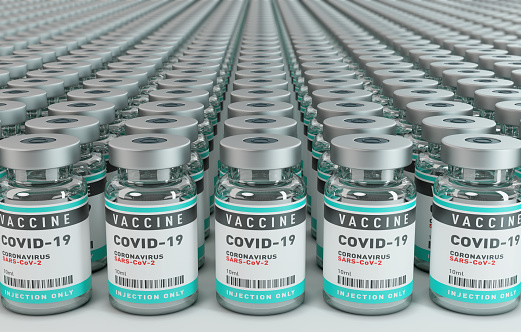Is social media playing a role in increasing COVID vaccine hesitancy?
MDlinx Aug 02, 2022
Social media gives people the power to instantaneously share and spread information across the globe. In the wake of the COVID-19 pandemic and with the rise of political unrest and economic tumult, people have increasingly turned to the internet as their main source of news.

Increased reliance on websites like Instagram and Twitter may have given these sites the power to sway users’ opinions on topical events, including COVID-19.
Although acceptance of the COVID-19 vaccine is growing worldwide, this is not the case in the US, and the influence of spread misinformation on social media may be playing a role.
The power of social media
According to the Reuters Institute Digital News Report 2020, issued by the Reuters Institute for the Study of Journalism and Oxford University, 12% of social media users rely on Twitter to keep up with current events, and 11% use Instagram.
Forbes reported that the shift from traditional news sources like TV and newspapers is led by Gen Z—those under the age of 25.
Vorhaus M. People increasingly turn to social media for news. Forbes. June 24, 2020.
Among Generation Z users who consult social media for news, two-thirds use Instagram. People in this group are two times more likely to read news on social media apps than on other sources.
US vaccine hesitancy rising
Recently, there has been a trend regarding public opinion on the COVID-19 vaccine. An article published by Nature Communications revealed that in a 2021 survey of over 23,000 individuals across 23 countries, 75.2% of respondents reported increased vaccine acceptance, a jump from 71.5% in 2020.
Lazarus JV, Wyka K, White TM, et al. Revisiting COVID-19 vaccine hesitancy around the world using data from 23 countries in 2021. Nat Commun. 2022;13(1):3801.
As of June 2021, vaccine hesitancy in the US had increased by 8.8%.
Other countries with increased rates of hesitancy were Russia (3.3%), Nigeria (8.2%), and South Africa (20.9%).Hesitancy linked to false information.
The ability to share news online is fantastic for keeping users well-informed, but it also allows for the spread of false information. In regard to COVID-19, much misinformation pertains to vaccine safety.
Researchers publishing a 2022 study in Nature analyzed 55 million tweets and used data from the CDC to investigate how social media misinformation may be linked to vaccination rates across the US. They found a direct correlation between vaccine hesitancy and false information. According to the researchers, these associations “remain significant when accounting for political as well as demographic and socioeconomic factors.”
Joi P. Misinformation on social media is linked to vaccine hesitancy, says study. GAVI, The Vaccine Alliance. May 5, 2022.
The implications of this study were not lost on GAVI, an international organization dedicated to improving global health by the equitable use of vaccines. This is what they noted on the topic:
Sharing false information, even when later debunked, correlates with people either delaying vaccination or refusing the vaccine outright.
GAVI also points out that vaccine-hesitant individuals are often more likely than others to post misinformation, in an effort to “raise awareness” among others about their misbeliefs.
According to GAVI, popular false claims include the notion that vaccines can alter our genes, or that COVID-19 is caused by 5G technology being distributed around the world.
Quelling skepticism
In the face of growing vaccine hesitancy, it’s important to use social media to educate users on the safety of COVID vaccines.
According to Johns Hopkins Medicine, the two mRNA vaccines, produced by Pfizer and Moderna, are statistically proven to prevent serious or fatal cases of COVID-19, with extremely low risk of side effects.
Marakagis L, Kelen GD. Is the Covid-19 vaccine safe? Johns Hopkins Medicine. Updated January 4, 2022.
Both the Pfizer and Moderna vaccines received full FDA approval, as well.
Researchers at Johns Hopkins have also disproven commonly believed myths about the vaccine—such as the major one that the vaccine affects fertility.
In 2021, a rumor about the spike protein on the coronavirus being identical to a different spike protein related to placenta growth during pregnancy erupted on social media.
Kelen GD, Marakagis L. Covid-19 vaccines: myth versus fact. Johns Hopkins Medicine. Updated March 10, 2022.
The false report claimed that the vaccine would cause a woman’s body to fight this different spike protein, negatively affecting her fertility. This simply is not true, but social media’s seamless sharing made this rumor spread like wildfire.
Another rumor—that the vaccine can alter our genes—also spread online. However, even though the messenger RNA from COVID-19 vaccines does enter cells, it does not enter the nucleus, which is where DNA resides.
To combat myths like this, clinicians can use their social media platforms to broadcast the facts. Seeing licensed healthcare professionals retweet or repost accurate information not only speaks to their credibility, but it may make viewers more apt to believe what these authorities are sharing. After all, it’s a clinician’s job (and not that of an average social media uses) to promote public health and safety.
Darien Sutton, MD, MBA, is one physician who is using his influence to spread reputable information. He uses his Instagram account to keep his followers up-to-date on breaking news in healthcare. He has various posts and highlights on his page about COVID-19, monkeypox, and general health tips.
Relaying accurate and medically reviewed information about the COVID-10 vaccines is imperative to keeping hesitancy rates low. If you see information being reposted on social media, it is important to always check the source to see if what you are reading is true. Clinicians can also use their own social platforms to ensure the distribution of accurate and factual information—both regarding COVID-19 and other health-related news.
-
Exclusive Write-ups & Webinars by KOLs
-
Daily Quiz by specialty
-
Paid Market Research Surveys
-
Case discussions, News & Journals' summaries